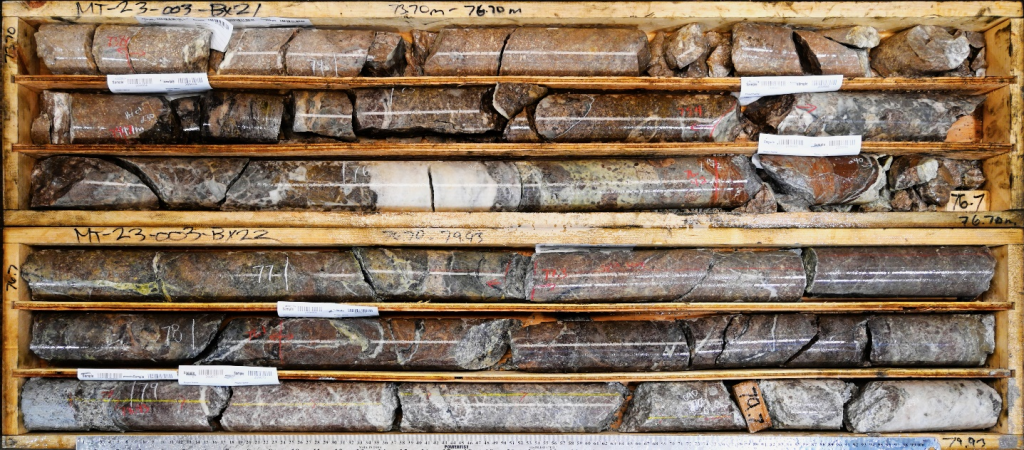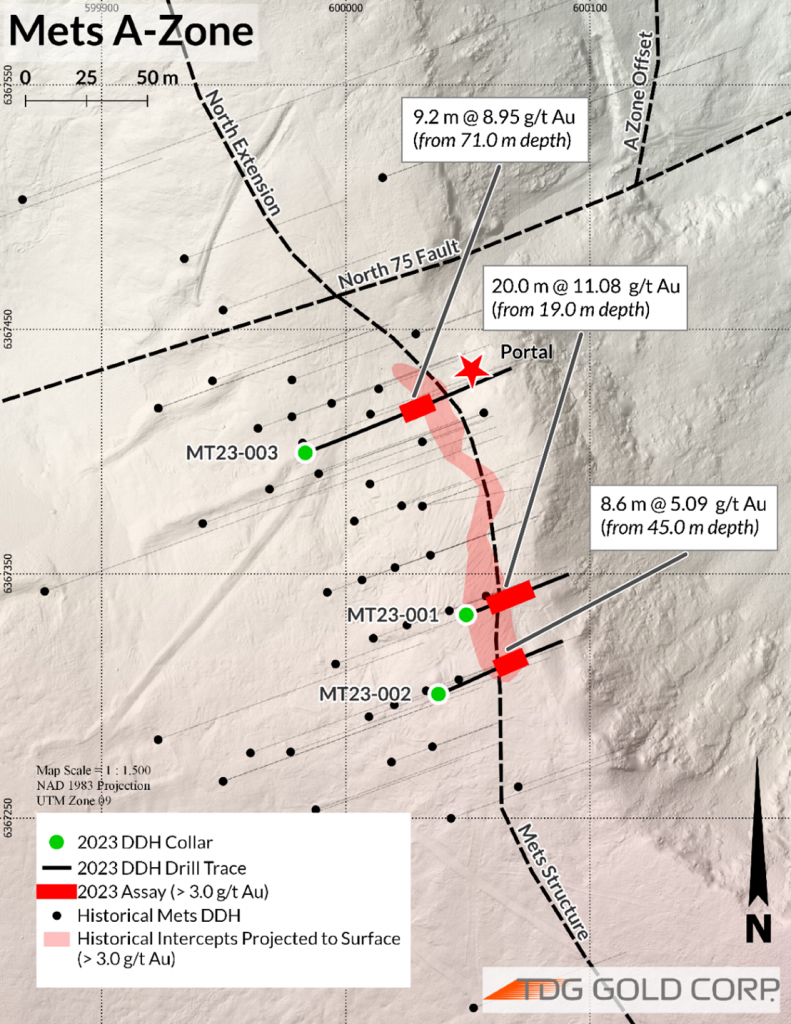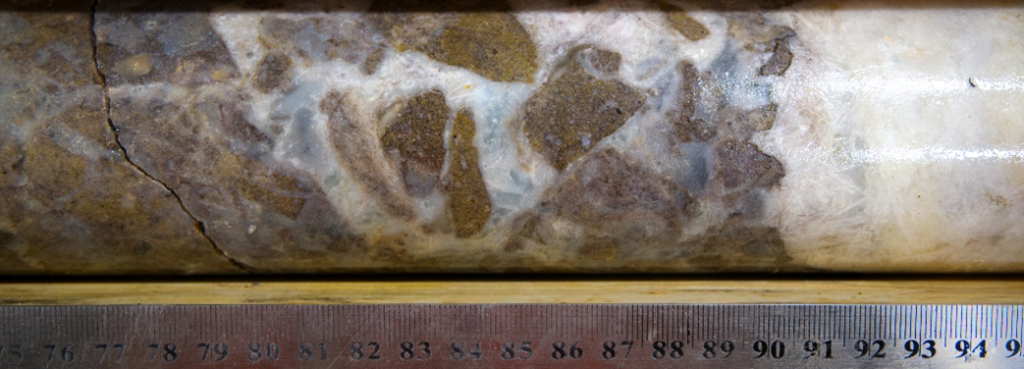TDG GOLD INTERSECTS 9.2 M OF 9.0 G/T GOLD FROM 71 M DEPTH AT METS, TOODOGGONE
White Rock, British Columbia, September 11, 2023. TDG Gold Corp (TSXV: TDG) (the “Company” or “TDG”) is pleased to report further high-grade, near-surface gold (“Au”) mineralization intersected in two additional diamond drillholes at TDG’s 100 % owned Mets mining lease located in the Toodoggone District of north-central B.C.
Diamond drillhole (HQ, oriented) MT23-003 was completed in the Mets A-Zone1 and intersected:
- 8.95 grams per tonne (“g/t”) Au, 2 g/t silver (“Ag”) over 9.2 metres (“m”) from 71.0 m downhole depth using a cut-off grade (“COG”) of 3.00 g/t Au;
- including 14.85 g/t Au, 3 g/t Ag over 4.8 m from 75.4 m downhole depth, using a COG of 5.00 g/t Au (Image 1 & Table 1).
Diamond drillhole (HQ, oriented) MT23-002 was completed in the Mets A-Zone1 and intersected:
- 5.09 g/t Au, 2 g/t Ag over 8.6 m from 45.0 m downhole depth, using a COG of 3.00 g/t Au.
Assay results were received from MSA Labs Canada (“MSA”). Results are considered preliminary with the necessity to run metallic screen analysis for individual samples reporting > 20 g/t Au. Final results will be reported in due course. Results from additional drillholes completed at Mets are pending.

(metal ruler is 1.0 m total length).
Table 1. Preliminary assay results from Mets A-Zone1 drillholes MT23-002 and MT23-003.
| Hole | From (m) | To (m) | Interval (m) | Au (g/t) | Ag (g/t) |
| MT23-002 | 45.0 | 53.6 | 8.6 | 5.09 | 2 |
| MT23-003 | 71.0 | 80.2 | 9.2 | 8.95 | 2 |
| incl. | 75.4 | 80.2 | 4.8 | 14.85 | 3 |
** Intervals are core-length weighted. True width is estimated between 80-90 % of core length; core recovery is estimated to be on average > 80 %, whereas core recovery is an average of > 95 % through the mineralized composites stated in the Table.
*** Composite results were built using 3.0 g/t Au cut-off, although there may be intervals within the composite below 3.0 g/t Au.
**** Calculated composites are truncated to significant 2 decimal places for Au and the nearest integer for Ag.
*****Calculated composites may not sum due to rounding.

Next Steps
Genevieve Huyer, TDG’s Mets Project Geologist, commented: “We have a high-resolution ground-based very low frequency (‘VLF’) and ground magnetic geophysical survey underway. This is a combined technique with a track record of success in delineating epithermal vein structures. The results of the survey should extend and expand on our previous geophysics completed in 2021.
Structural geology is the key to unlocking Mets and we anticipate that drilling larger diameter (HQ/PQ), oriented core, in conjunction with geophysical data and modern 3D modelling, should allow us to track the mineralized high-grade structure across the entire Mets mining lease.”
Mineralization Encountered
Drillhole MT23-002 and MT23-003 are interpreted to have intersected the same mineralized structure as MT23-001 (see September 7, 2023) and reported high-grade Au in the hydrothermal quartz-barite breccia (Image 2). These drillholes were designed as near-neighbour drillholes, in close proximity to historical drilling2,3, and were designed to test continuity across ~100 m of strike length of the ~130 m Mets A-Zone.

QA/QC
Samples for the Mets 2023 drill program were handled via rigorous chain of custody, including sample collection, processing, and delivery to the MSA laboratory in Langley, B.C. The drillcore was logged, photographed, and sampled at TDG’s Baker Mine site and processed by geologists and technicians. Quality assurance and control (“QAQC”) materials were inserted into the sampling sequence during geological sample selection. The drillcore was selected for sampling and placed in zip-tied polyurethane bags, then in security-sealed rice bags before being delivered directly by TDG staff from the Baker Mine site to the MSA facility in Langley, B.C. Samples were prepared and analyzed following procedures: CRU-240,SPL-415,PPU-510 for sample preparation, FAS-221 for Au and IMS-230 for Ag and trace elements. Overlimit concentrations (> 20 ppm Au) of precious metals will be analyzed (where applicable) by MSC-550. Information about methodology can be found on the MSA Labs website, in the analytical guide (here).
QAQC is maintained internally at the lab through rigorous use of internal certified reference materials (“CRMs”), blanks, and duplicates. An additional QAQC program was administered by TDG through the verification of lab results via use of CRMs and blank (unmineralized) samples that were blindly inserted into the sample batch. If a QAQC sample returns an unacceptable value an investigation into the results is triggered and when deemed necessary, the samples that were tested in the batch with the failed QAQC sample are re-tested.
Table 2 presents the particulars for the drillholes in this news release. During the sampling process, HQ drillcore was split in half using a mechanical core splitter. The collar location was located using Global Positioning System (“GPS”) Real Time Kinematics (“RTK”) system with high precision.
Table 2. Drillhole Particulars
| HOLE ID | UTME NAD83 (mE) | UTMN NAD83 (mN) | Azimuth (°) | Dip (°) | Final Depth (m) |
| MT23-002 | 600,037.9 | 6,367,300.8 | 70 | -50 | 82.6 |
| MT23-003 | 599,983.4 | 6,367,399.5 | 70 | -50 | 136.7 |
Qualified Person
The technical content of this news release has been reviewed and approved Steven Kramar, MSc., P.Geo., Vice President, Exploration for TDG Gold Corp., a qualified person as defined by National Instrument 43-101.
1Mineral Exploration/Exploration Target Area(s): TDG is a mineral exploration focused company and the Company’s Projects are in the mineral exploration stage only. The degree of risk increases substantially where an issuer’s properties are in the mineral exploration stage as opposed to the development or operational stage. Exploration targets and/or Exploration zones and/or Exploration areas are speculative and there is no certainty that any future work or evaluation will lead to the definition of a mineral resource.
2Historical Data: This news release includes historical information that has been reviewed by TDG’s qualified person (QP). TDG’s review of the historical records and information reasonably substantiate the validity of the information presented in this news release; however, TDG cannot directly verify the accuracy of the historical data, including (but not limited to) the procedures used for sample collection and analysis. Therefore, any conclusions or interpretations borne from use of this data should be considered too speculative to suggest that additional exploration will result in mineral resource delineation. TDG encourages readers to exercise appropriate caution when evaluating these data and/or results.
3Historical Drillcore Sampling & Assay Methodology: Historical drillcore was geologically logged with lithologies identified and notable geological features recorded. Historical drillcore was split in half (and in rare cases sawn in half) along sample intervals (lithology and mineralization dependant) generally less than 3 m. Chemical analysis was performed dominantly for precious metal analysis (Au and Ag), and infrequently for base metals (Pb, Zn, Cu), and rarely for major elements and trace elements. Historically, different commercial laboratories were utilized in addition to an assay lab at Baker Mine Site. These lab facilities may or may not have had accreditation and in all cases accreditation (if applicable) pre-dated current ISO standards. Over that period, a variety of digestion and assay methods were used, including atomic absorption, fire assay atomic absorption, aqua regia atomic absorption and aqua regia ICP with varying detection limits. Reference materials (if any) were inserted at the analytical level and thus were unblind to the facility processing the samples.
About TDG Gold Corp.
TDG is a major mineral tenure holder in the historical Toodoggone Production Corridor of north-central British Columbia, Canada, with over 23,000 hectares of brownfield and greenfield exploration opportunities under direct ownership or earn-in agreement. TDG’s flagship projects are the former producing, high-grade gold-silver Shasta and Baker mines, which produced intermittently between 1981-2012, and the historical high-grade gold Mets developed prospect, all which are all road accessible, and combined have over 65,000 m of historical2,3 drilling. The projects have been advanced through compilation of historical2 data, new geological mapping, geochemical and geophysical surveys and, at Shasta, 13,250 m of modern HQ drill testing of the known mineralization occurrences and their potential extensions. In May 2023, TDG published an updated Mineral Resource Estimate for Shasta (see TDG news release May 01, 2023) which remains open at depth and along strike. In January 2023, TDG defined a larger exploration target area adjacent to Shasta (Greater Shasta-Newberry; see TDG news release January 25, 2023). In September 2023, TDG published the first modern drill results from the Mets mining lease (see TDG news release September 07, 2023).
ON BEHALF OF THE BOARD
Fletcher Morgan
Chief Executive Officer
For further information contact:
TDG Gold Corp.,
Telephone: +1.604.536.2711
Email: info@tdggold.com
Neither TSX Venture Exchange nor its Regulation Services Provider (as that term is defined in the policies of the TSX Venture Exchange) accepts responsibility for the adequacy or accuracy of this release.
Forward Looking Statements
This news release contains forward-looking statements that are based on the Company’s current expectations and estimates. Forward-looking statements are frequently characterized by words such as “appear”,” interpret”, “anticipate”, “unlock”, “extend”, “continuity”, “target”, “underway”, “demonstrate”, “track”, “clearer”, and variations of these words as well as other similar words or statements that certain events or conditions “could”, “may”, “should”, “would” or “will” occur. Such forward-looking statements involve known and unknown risks, uncertainties and other factors that could cause actual events or results to differ materially from estimated or anticipated events or results implied or expressed in such forward-looking statements. Such factors include, among others: the actual results of current and planned exploration activities including the potential for the definition of a high-grade gold or other style of mineral deposit with economic grades within the Mets mining lease; results from future exploration programs; conclusions of future economic evaluations; changes in project parameters as plans to continue to be refined; possible variations in grades of mineralization and/or future actual recovery rates; accidents, labour disputes and other risks of the mining industry; the availability of sufficient funding on terms acceptable to the company to complete the planned work programs; delays in obtaining governmental approvals or financing; and fluctuations in metal prices. There may be other factors that cause actions, events or results not to be as anticipated, estimated or intended. Any forward-looking statement speaks only as of the date on which it is made and, except as may be required by applicable securities laws, the Company disclaims any intent or obligation to update any forward-looking statement, whether as a result of new information, future events or results or otherwise. Forward-looking statements are not guarantees of future performance and accordingly undue reliance should not be put on such statements due to the inherent uncertainty therein.